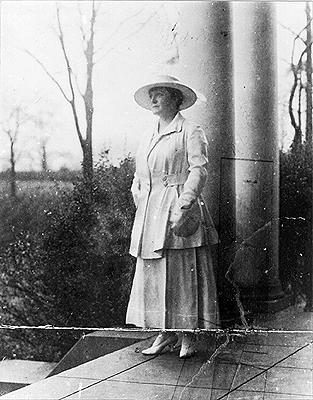

Mary Roberts Rinehart BORN: 12 August 1876.(50) DIED: 22 September 1958.(51) BURIED:
While her general novels were her best-selling books, she was most highly regarded by critics for her carefully plotted murder mysteries. It was one of her books that produced the phrase, "The butler did it," and in her prime, she was more famous than her chief rival, England's Agatha Christie. (52)
Our Famous Woman Writer.
One of Pittsburgh's most famous women is Mary Roberts Rinehart, the
writer.
She was born Aug. 12, 1876, in a little house in Arch St., now North
Side, but then the City of Allegheny. She lives today at 630 Park Ave.,
New York City, in an 18-room apartment.
She's still writing--about 4000 words a day on a "good day." She has
written more than 50 books, eight plays, hundreds of short stories, poems,
travelogues and special articles. Three of her plays were running on
Broadway at one time.
When she was in Allegheny High School she got $1 each for three short
stories from a Pittsburgh newspaper. In her own words, "I did no further
so-called literary work until 12 years later when I was 27."
Her first book, "The Circular Staircase," was published in 1908 when
Theodore Roosevelt was President, the hobble skirt was something of a
national scandal and ministers spoke of the lawn hammock as a challenge
to morals.
In this book, Mrs. Rinehart proved, for the first time, that mystery,
crime and humor can be combined.
It has generally been believed in Pittsburgh for many years that the
Singer mansion in Wilkinsburg was the site of the Circular Staircase.
Mrs. Rinehart tells me it was not--that, at the time, she had never known
of a house with such a staircase.
Last year she wrote "A Light in the Window," the story of two World War
generations, with the flush and hard times in between. Her writings have
encompassed two generations; outlived two Roosevelt presidents.
She never has believed that life is easy, but that if a guy is down he
can always get up and keep on fighting. That's been the rich history of
her own life.
Her parents were Thomas B. and Cornelia Roberts. She early learned
about financial insecurity. Her father was handsome, dreamy,
impractical--a frustrated inventor, always in pursuit of fortune, never
finding it. His most practical invention was a rotary shuttle for sewing
machines. He hated the sewing machine business.
Mrs. Rinehart's mother took in two boarders--made Mary help with the
housework, after school, and take piano lessons--both of which she hated
with equal vigor. Her grandmother, partially blind, was a seamstress. It
was a constant struggle for the family to "keep up appearances," Mrs.
Rinehart writes in her autobiography, "My Story."
Mary Roberts Rinehart's writing career blossomed in debt, found its
creative equality in her retentive memory and a discipline to put it
down.
Her early memories were of the house next door, where a mute son talked
with his hands to his patient white-haired mother; wagons clattering
along cobblestone streets; the Mayor's
office, where she could read good books; the high walls of the state penitentiary, when it was only a few
blocks from her house; watching the debris and bodies of the Johnstown
Flood roll by; the time her father, in a high silk hat, calmly and
serenely rowed his flood-beleagured family past the second floor windows
of Pittsburgh office buildings. The
one-armed park policeman, who marched in GAR [Grand
Army of the Republic] parades and once arrested his own son; tradesmen
scattering for cover when drovers reported the escape of a wild bull; the
jolly neighborhood butcher, always wearing a stained straw hat.
She was born left-handed, in the days when this was looked upon as
irrational and unladylike. To make her use her right hand, the left was
tied behind her back. She now writes right-handed, with a bold sweep of a
special pen and never uses the typewriter.
About the pen. She once complained she had never found one which could
write as fast as she could think. Kenneth Parker of the Parker Co. sent
her this snub-nosed one.
No servant may touch it. When she leaves her desk, the pen goes with
her--to a special box by her bedside. If she leaves New York, the pen
goes too. (53)